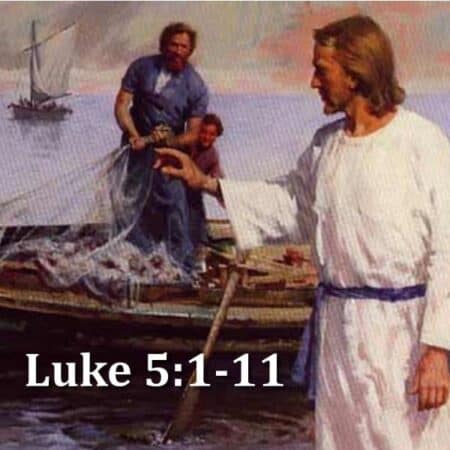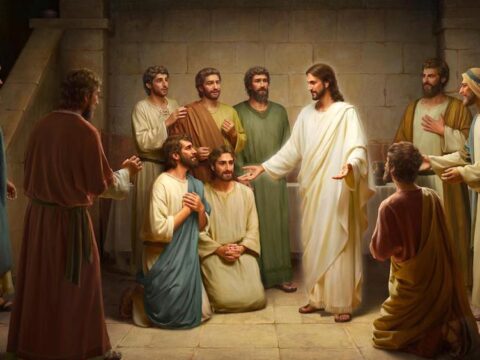In this short account of Jesus’ ministry, we meet a group of fishermen. They are washing their nets, preparing them for the coming harvest. Jesus, seated in the boat, was able to observe the scene in a unique way. Traditionally, people taught from a seated position.
Luke 5:1-11 Jesus calls His First Apostle
One day as Jesus was standing by the Lake of Gennesaret,[a] the people were crowding around him and listening to the word of God. 2 He saw at the water’s edge two boats, left there by the fishermen, who were washing their nets. 3 He got into one of the boats, the one belonging to Simon, and asked him to put out a little from shore. Then he sat down and taught the people from the boat.
4 When he had finished speaking, he said to Simon, “Put out into deep water, and let down the nets for a catch.”
5 Simon answered, “Master, we’ve worked hard all night and haven’t caught anything. But because you say so, I will let down the nets.”
6 When they had done so, they caught such a large number of fish that their nets began to break. 7 So they signaled their partners in the other boat to come and help them, and they came and filled both boats so full that they began to sink.
8 When Simon Peter saw this, he fell at Jesus’ knees and said, “Go away from me, Lord; I am a sinful man!” 9 For he and all his companions were astonished at the catch of fish they had taken, 10 and so were James and John, the sons of Zebedee, Simon’s partners.
Then Jesus said to Simon, “Don’t be afraid; from now on you will fish for people.” 11 So they pulled their boats up on shore, left everything and followed him.
Simon Peter
Simon Peter’s story in Luke 5:1-11 has several features in common with the stories of other Bible characters. For example, it shares many similarities with the stories of Exodus 3:11 and Isaiah 6:1-11. Furthermore, the story also shares similarities with the story of Moses.
The story of Simon Peter in Luke 5:1-11 can be understood within the context of Lukan theology. In it, Jesus calls Simon Peter to be his representative and a leader in the Church. Unlike the other disciples, Simon did not reject the call of Jesus. However, he reverted to fishing. This may reflect his own sin in turning away from the Lord, or it may reflect his doubts about Jesus’ ability to provide for him and his followers.
The story of Jesus calling Simon Peter is also found in John 20:21. After seeing Jesus and receiving his commission, Peter returned to the Sea of Galilee to fish. In doing so, he stepped out of his comfort zone and left his familiarity. In both stories, Jesus is the one who first calls Simon Peter.
Jesus’ call to become a fisher of men
In Luke 5:1-11, Jesus takes the initiative and calls Simon to become a fisher of men. Peter, James, and John had no intention of becoming fishers, but Jesus had other plans. He would teach them about the kingdom and invite them to follow him.
Jesus wanted to do something good for Simon, the one who lent Him a boat. And Simon’s response was radical. He wanted to do something good for his master without expecting anything in return. Luke’s Gospel uses the ancient Greek word epistata for “master,” which also means “commander, leader, or boss.”
Jesus then asks them to let down their nets for the catch. They agree, and soon they are enclosing an enormous number of fish. Eventually, the nets break and the boat begins to sink. The other fishermen, James and John, come alongside the boat and help them pull the nets into the boat. After a long day, they catch enough fish to fill their boat.
Jesus’ healing of the paralyzed man
The paralyzed man in Luke 5:11-11 is a prime example of the power of prayer. Jesus healed this man, whose sins had rendered him unable to move or speak. He was able to restore his mobility and declared that his sins were forgiven. As he healed the man, the Pharisees and scribes began to reason against him, and Jesus asked them why they were reasoning.
This passage has two main themes. First, Luke emphasizes Jesus’ authority. In contrast to the previous gospel, Luke places emphasis on Jesus’ power over nature. Second, Luke highlights Jesus’ fulfillment of Old Testament prophecy. The fishermen are supposed to gather the scattered children of Israel, and Jesus will act on their behalf to save men from death. Third, Jesus reveals Himself as the introducer of the last days, and His disciples were called to carry out God’s will in the last days.
Jesus’ command to let down his nets
Jesus’ command to let down his nets is a powerful example of faith in action. Peter, who was a master at catching fish, was asked by Jesus to let down his nets, but Peter hesitated. He had sober considerations as a fisherman, but he also had love for Jesus. In fact, Peter addressed Jesus as his master, which shows his affection for the Master.
As the fishermen were fishing, Jesus stopped by one of them to preach the kingdom of God. While Jesus was preaching to the crowd, he noticed some fishermen who had come to listen to him. He told them to let down their nets so that they might be able to catch more fish. He was aware that fishermen were tired and had been working all night. He had compassion for them and wanted to help them.
Peter’s confession of sinfulness
Peter’s confession of sinfulness in Luke’s Gospel is a crucial moment in the life of the apostle. Peter recognizes that he is a sinner and pleads with Jesus to leave him alone. However, his response isn’t a full-blown recognition of Jesus or repentance. Rather, it reveals the quality of a seeker who is aware of his own unworthiness before God. The recognition of one’s state of loss is inevitable when grace is brought to bear on a sinner’s life.
Despite his professional experience as a fisherman, Peter obeyed the Lord and acted in ways that contradicted his own professional judgment and professional experience. In doing so, he conquered his own self and was able to act supernaturally. In doing so, Peter demonstrated that he was more than an admirer of Jesus.







